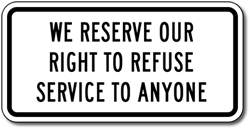Practically, yes. But the law doesn't look at the practical. The law looks at the event through the lens of the law. You didn't said, "It's because you're gay." That is the key in court. If he's asked, "Did he tell you he couldn't bake the cake because you're gay," he has to respond, "No." And if you've got the sign up in your shop, that's all that need be done. Cases of this nature have been upheld by U.S. courts for nearly 50 years.
It means people have to change the way they proceed to the point of sale, too. I'm not sure I've ever been told "Sure!" right off the bat. How does the service provider know I'm not about to ask him for "a cake" the size and shape of an Abrams tank, for the convention in town next week that I'm planning the food and entertainment for? He has to ask questions, and he may not be prepared to bake a cake the size and shape of an Abrams tank.
The baker should ask, "what kind of event, where, etc?" This gives him/her any number of reasons to turn down the business. No one just jumps in with "Sure!" Not if they're smart. That simple little word is a commitment. No one should be committing to anything until they know what the job is.
I've got a small home building business on the side. It's something I did right out of the military, working for my ex-father-in-law and then going out on my own. I love the business. I like the smell of wood, the process of turning a hole in the ground into a house. So I've kept my hand in. It paid for my Masters.
When someone comes to me asking me to build for them, I want to see their plans, if they have any. It may not be where I want to build, it may not be the style I want to build, it may be I will find out, in talking to them, that they are one of those impossible customers that all home builders detest, and I'm comfortable enough to turn down a job if I think it's going to be a pain in my gluteus maximus. So I ask questions, I want concepts, I pick their brain, and in the end, for any reason, I can say "No, I don't think I can help you." I give them the name of a couple other builders, and that's the end of it. I could do the same -- though I've never been presented with the situation -- if it was a gay couple. No, I wouldn't have a problem building for a gay couple, particularly since the close working partnership of a builder and a buyer gives me opportunity to show them love and tolerance so they come away with a much better impression about Christians. But using my approach, I still don't have to accept the job. Maybe I see they are militant, and don't want to hear what a Christian has to say. I can say "No," and no one's feelings are hurt.
If bakers, photographers, etc., aren't doing business that way, then they get what they deserve. No one should say "Sure!" right off the bat. Get information. Then decide whether you want the job. And if you do it right, and have the sign up, no one can sue.
Again, the laws proposed in Arizona and Kansas were the worst sort of Jim Crow laws against gays. And we, as Christian, were going to put ourselves out front as endorsing them. Terrible idea. Terrible witness. Not something we want, as the body of Christ, to do.

